Frank Clark joined a number of younger participants in the fundraiser at St Thomas’ Hospital.
An 89-year-old man has abseiled from the top of St Thomas’ Hospital in central London for charity.
With a unique view of the London Eye and the Houses of Parliament, Frank Clark embarked on the 160ft (49m) journey on Friday to raise money for Guy’s and St Thomas NHS Foundation Trust, having been treated at both of its London hospitals in his lifetime.
Great-grandfather Mr Clark said before the abseil that it is “a tick on my bucket list”.
“I have wanted to do something wild for some time and my doctor has given me the green light, so nothing to stop me now (not even my daughter),” he wrote on his Virgin Money Giving page, where he has raised £390 of a £400 target at the time of publication.
The fundraiser was organised to celebrate International Nurses Day on Sunday.
Mr Clark was one of a number to take on the challenge.
The funds raised will go towards Evelina London Children’s Hospital, a Guy’s and St Thomas’ NHS Trust specialist hospital for children which is celebrating its 150th anniversary.
LESBOS, Greece (AP) — Most drowned making the hazardous sea crossing from nearby Turkey, while others died of natural causes in migrant camps on the Greek island of Lesbos.
After years of neglect, a makeshift burial ground for migrants on the island has been cleaned up and landscaped to provide a dignified resting place for the dead, and for their relatives to visit.
Earth Medicine, the Lesbos-based charity that handled the project near the village of Kato Tritos, formally handed over the redesigned cemetery to municipal officials on Wednesday.
“We wanted it to be clear that this was a burial ground, (mostly) for people who died at sea — some of whom have been identified while others have not,” Earth Medicine spokesman Dimitris Patounis said. “It used to be just a field.”
For years, Lesbos has been a major destination for people seeking a better life in the European Union. They leave Turkish shores crammed into small, unseaworthy vessels provided by smuggling gangs. About 3,800 people have made the journey so far this year.
Before the intervention, the weed-choked graves were marked by a simple stone with a number written on it by marker, or, in the rare cases when it was available, a name. Currently, about 200 neat, uniform gray slabs filled with white gravel cover each grave, clearly listing whatever is known of the occupant.
“Now people will be able to visit when their (dead) relatives are identified,” Patounis said.
Officials stress that the burial ground is nondenominational, with recent inhumation services conducted by an Imam, a Greek Orthodox or a Catholic priest, according to the deceased's known beliefs.
“This was done with human dignity in mind, without any religious affiliation,” Patounis said.
The cemetery lies about a kilometer (½ mile) outside Kato Tritos in central Lesbos, around 20 kilometers (12 miles) from the island capital of Mytilini. Other migrants have been buried in the past in municipal cemeteries in other parts of the island, but this is the only burial ground specifically for migrants.
Follow AP’s coverage of global migration at https://apnews.com/hub/migration
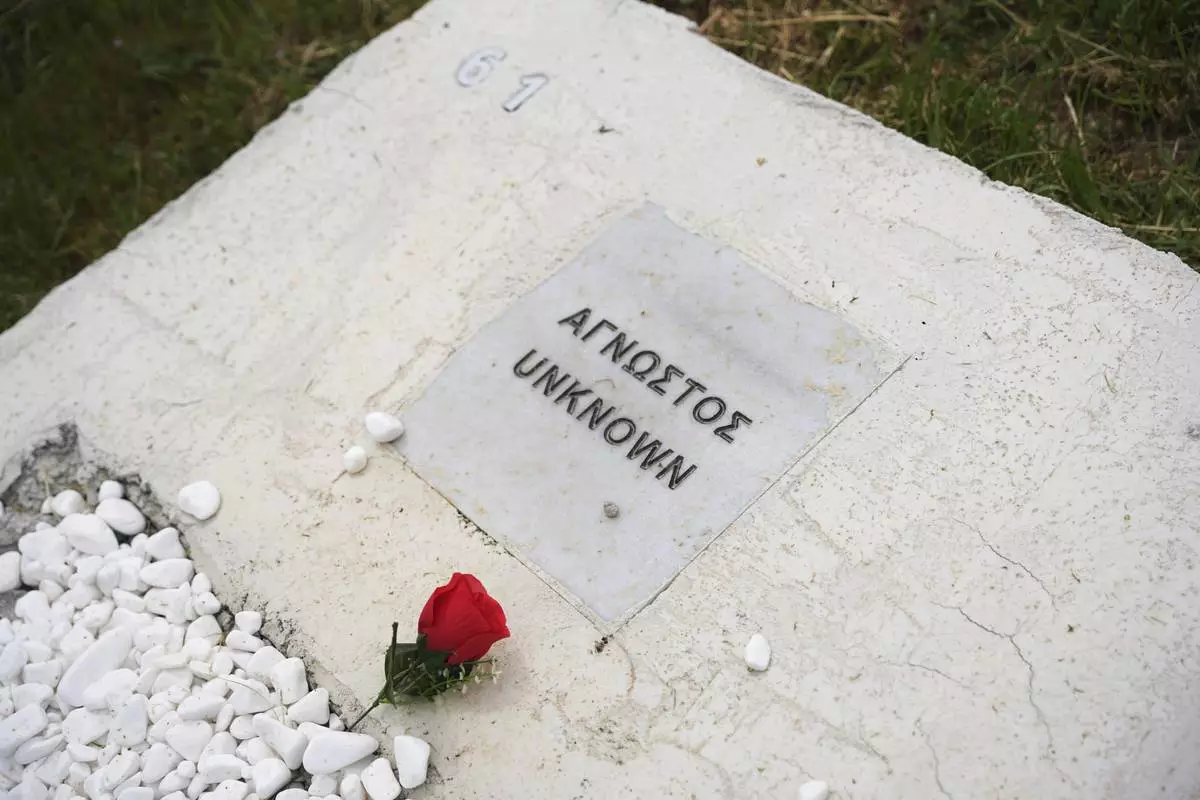
A grave of an unknown refugee is seen at the cemetery in Kato Tritos village on the northeastern Aegean Sea island of Lesbos, Greece, on Wednesday, April 17, 2024. After years of neglect, a primitive burial ground for refugees who died trying to reach Greece's island of Lesbos has been cleaned up and redesigned to provide a dignified resting place for the dead. (AP Photo/Panagiotis Balaskas)

A cemetery is seen from above at Kato Tritos village on the northeastern Aegean Sea island of Lesbos, Greece, on Wednesday, April 17, 2024. After years of neglect, a primitive burial ground for refugees who died trying to reach Greece's island of Lesbos has been cleaned up and redesigned to provide a dignified resting place for the dead. (AP Photo/Panagiotis Balaskas)
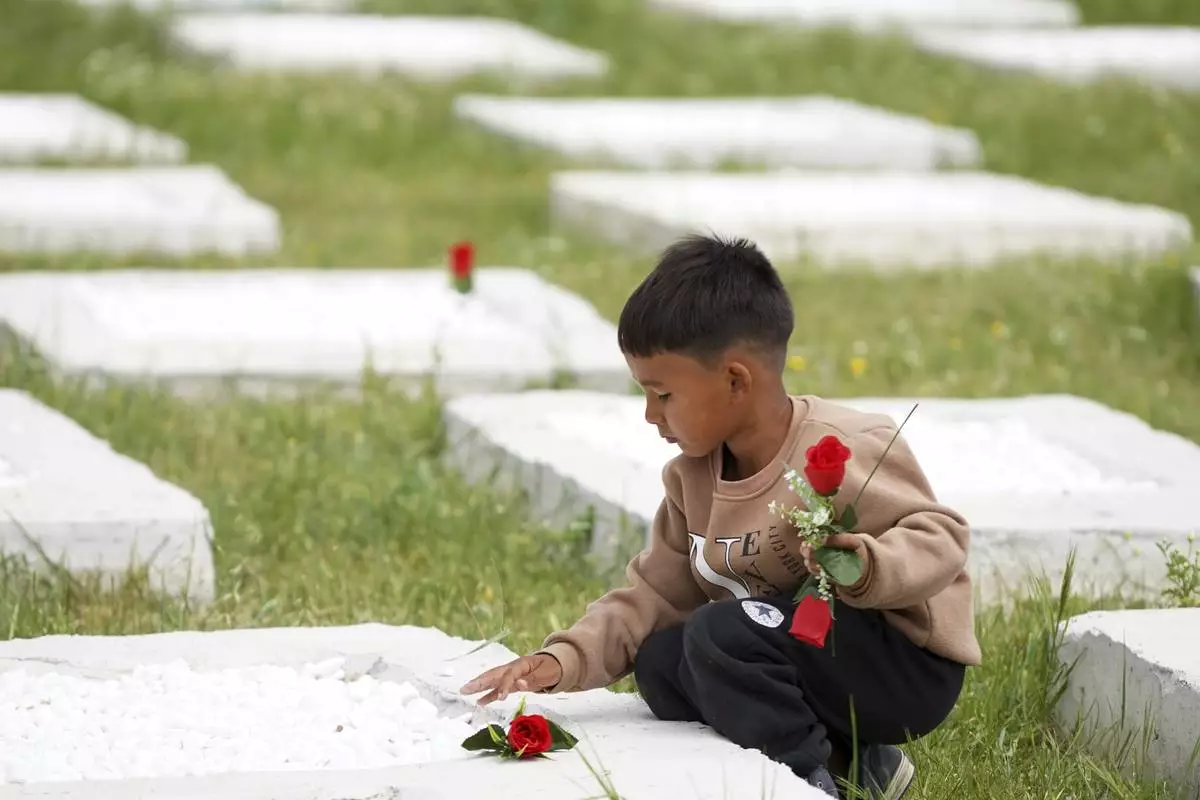
A boy lays flowers on a grave at the cemetery in Kato Tritos village on the northeastern Aegean Sea island of Lesbos, Greece, on Wednesday, April 17, 2024. After years of neglect, a primitive burial ground for refugees who died trying to reach Greece's island of Lesbos has been cleaned up and redesigned to provide a dignified resting place for the dead. (AP Photo/Panagiotis Balaskas)
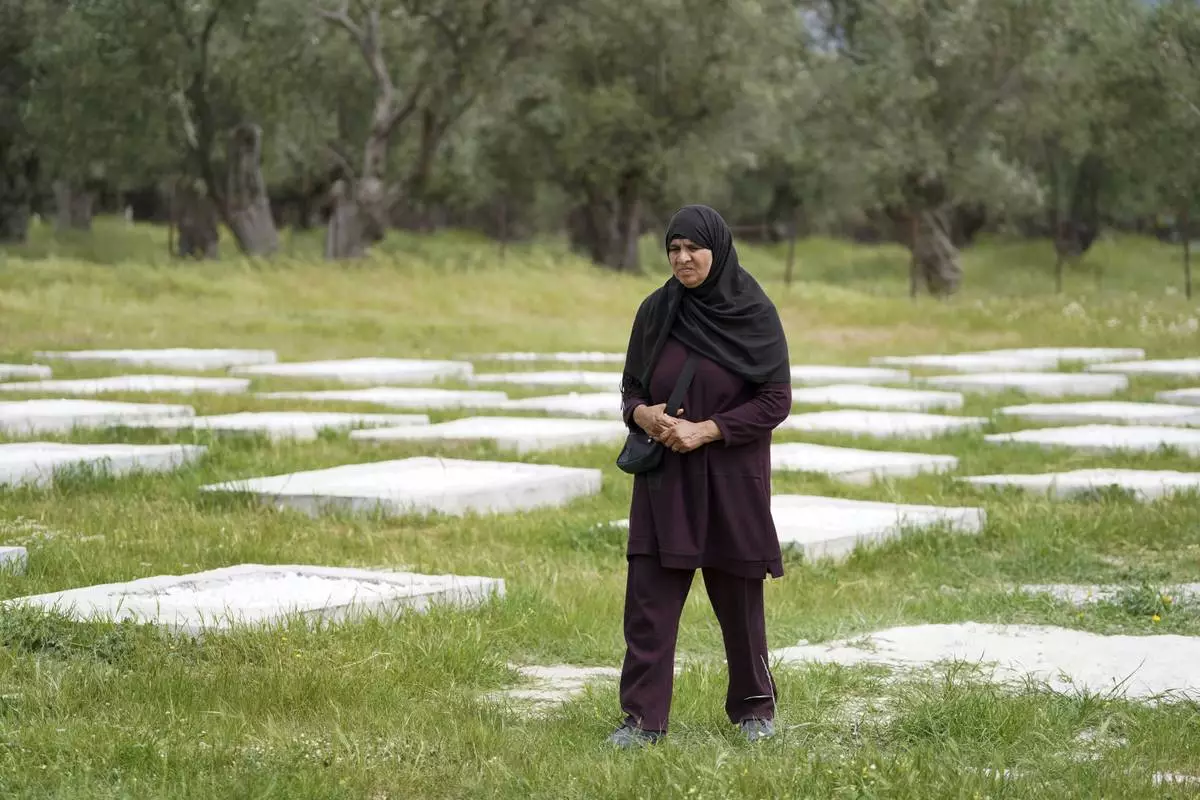
A woman walks at the cemetery in Kato Tritos village on the northeastern Aegean Sea island of Lesbos, Greece, on Wednesday, April 17, 2024. After years of neglect, a primitive burial ground for refugees who died trying to reach Greece's island of Lesbos has been cleaned up and redesigned to provide a dignified resting place for the dead. (AP Photo/Panagiotis Balaskas)
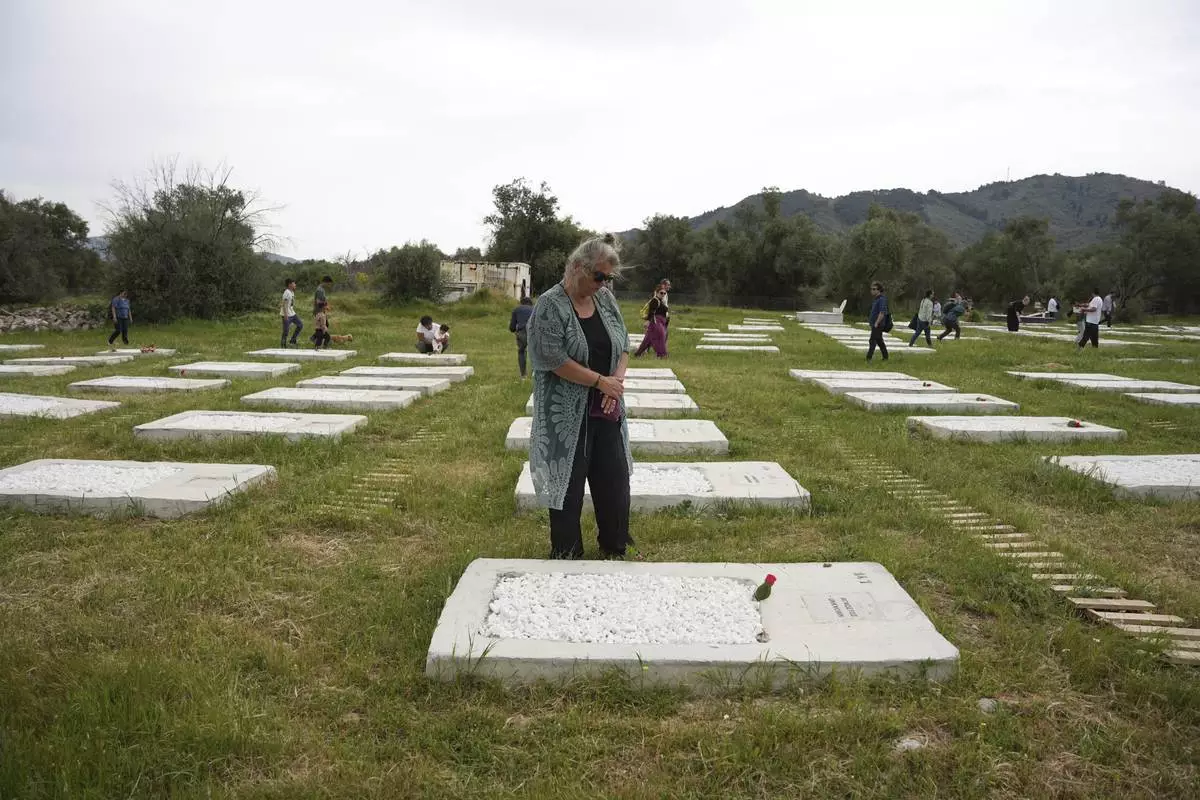
People visit the cemetery at Kato Tritos village on the northeastern Aegean Sea island of Lesbos, Greece, on Wednesday, April 17, 2024. After years of neglect, a primitive burial ground for refugees who died trying to reach Greece's island of Lesbos has been cleaned up and redesigned to provide a dignified resting place for the dead. (AP Photo/Panagiotis Balaskas)
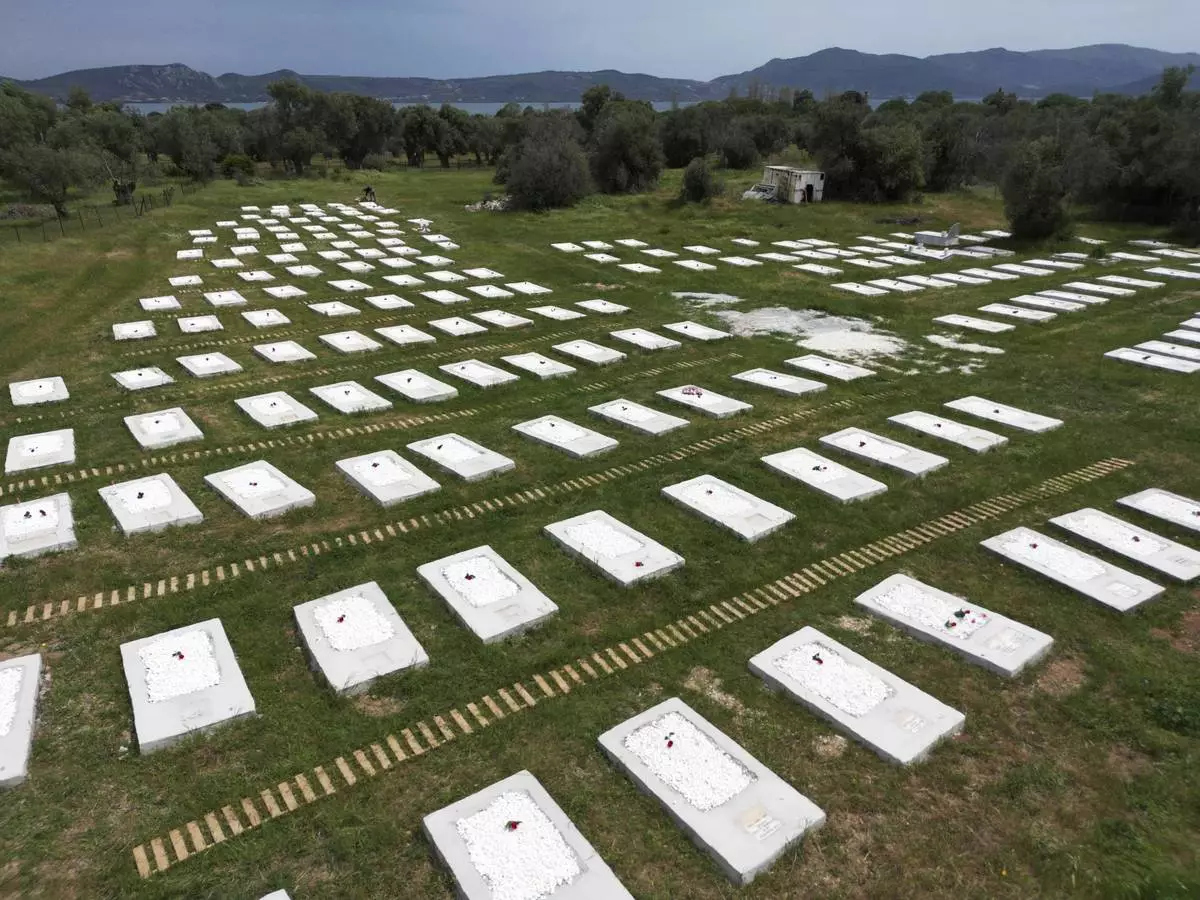
A cemetery is seen from above at Kato Tritos village on the northeastern Aegean Sea island of Lesbos, Greece, on Wednesday, April 17, 2024. After years of neglect, a primitive burial ground for refugees who died trying to reach Greece's island of Lesbos has been cleaned up and redesigned to provide a dignified resting place for the dead. (AP Photo/Panagiotis Balaskas)








